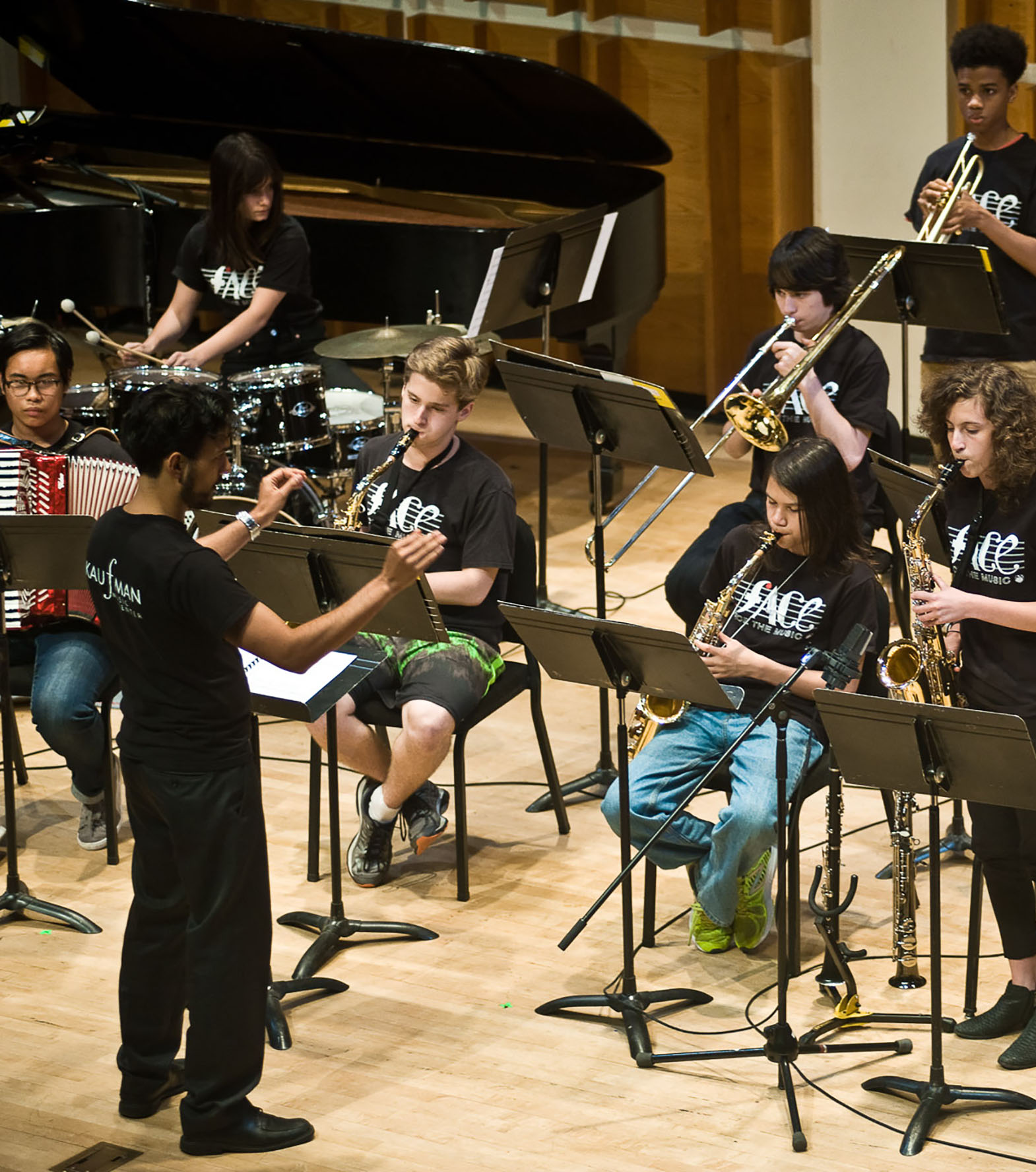
“Some of the most important things I can do as the leader of Kaufman Music Center are to give our students strong mentors and role models, and the opportunity to play music that really resonates with them. Our dual mission, which encompasses both education programs and Merkin Hall presentations, gives rise to mutually beneficial relationships between the artists on our stages, our faculty and the diverse students at Lucy Moses School, Special Music School and Face the Music.”
– Kate Sheeran, Executive Director, Kaufman Music Center
Mentorship is important for young people in any field. For aspiring musicians navigating the challenges and opportunities of studying music in the 21st century, a mentor can make all the difference. This is evident in all of Kaufman Music Center’s education programs. For the 100+ teens in Kaufman Music Center’s groundbreaking Face the Music program, engaging with adventurous works by living composers is a uniquely powerful experience. A diverse and committed group of coaches and composers serve as mentors, role models and examples of different pathways to careers in music, as well as inspiration for the students to compose their own works. In addition to their wonderful, dynamic coaches – David Bloom, Whitney George, Adrianna Mateo, Aakash Mittal, Hajnal Pivnick, Vasudevan Panicker and Mark Serkin – this winter the young musicians of Face the Music have the privilege of working with an incredible group of artists including ETHEL, Todd Rundgren, Helga Davis, Mazz Swift and International Contemporary Ensemble as well as composers Shelley Washington and Courtney Bryan among others.
“They’re an inspiration,” says Special Music School graduate and Face the Music composer Michelle David of her teachers and coaches. “Maybe in the future we will also be an inspiration to other women composers, who won’t be afraid of showing their music to the world.” Face the Music “blew me away,” recalls Special Music School and Face the Music alum Luis Diaz, who recently completed a Master’s degree in flute performance at the New England Conservatory. “The composers were coming in, and we were meeting them. That connection, being able to meet a composer and being able to ask them what they want, and being able to use my instrument in new ways, was so exciting.”
Composer Reena Esmail, a coach in Kaufman Music Center’s Luna Composition Lab program for self-identifying young female composers, identifies mentorship as key to empowering young people who have typically not seen themselves represented in the classical music field. “I’ve been so fortunate to have some incredible mentors who saw in me what I never would have been able to see in myself,” she says. “Women and minorities are fully aware that they are just as capable and creative as the people in the majority. But when they don't see themselves represented, it just conveys to them that our field is still too biased to accept them. Mentoring is truly where the heart of the change lies.”
“What I think is even more important than mentorship is example and opportunity,” says vocalist Helga Davis, who has found working with groups of children to be deeply moving. She aims “to make an impression, to inspire, to hold space for a young person who may have questions about their artistic practice or their life practice.”
Kaufman Music Center Mentors share some important life lessons:
· “You have so much more power than you think you do,” Esmail explains to her students. “Listen to yourself, to your voice, to what feels true within you. Keep trying to find that unique way to express yourself. We adults need your voice more than we are willing to admit. Don't give up on us – don't stop trying to teach us. We are listening.”
· “I’d like the songwriters to be in touch with the electricity of their intuition,” says Adrianna Mateo, a violinist, alt-pop artist, singer-songwriter and actress who led Face the Music’s first songwriting workshop this fall and calls mentorship a symbiotic relationship that benefits mentors as much as their students. “It’s powerful and rarely, if ever, wrong. I also hope I gave them a bit more courage to try things that scare them, at least artistically speaking. That's how you grow – and especially how you increase your range.”
· Davis says, “The most important thing is for them not to wait for other people to give them permission to be creative people, and not to wait for institutions to sanction their work, their education or their ideas. And also to remember that an artistic life is a practice. It is a way of seeing the world. It’s a way of thinking, of eating, of walking, of appreciating life that happens every day.”
See Face the Music in action at these upcoming performances:
Jan 14: Face the Music with Mazz Swift & International Contemporary Ensemble at Roulette
Feb 11: Face the Music & Helga Davis at National Sawdust
Mar 17: Face the Music, ETHEL & Todd Rundgren at Merkin Hall
See the full schedule.
